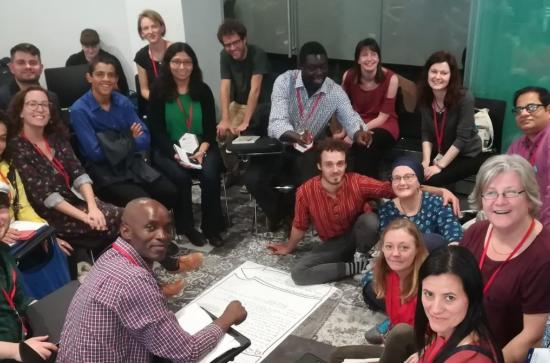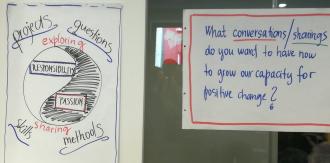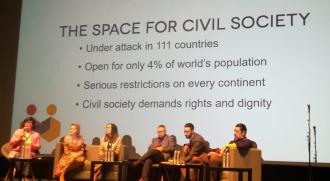
Where Civil Society and Critical Global Education Meet – Reflections from the ICSW and Bridge 47, Belgrade, April 11th 2019
Introduction
Relatively unusually, Belgrade stands at the confluence of two rivers, the Danube and the Sava. From any vantage point, one can see that like the veins of a leaf, the city scape is dissected by these two rivers which are crisscrossed by the many bridges which connect people and districts on all sides. How fitting therefore that the theme of ‘building bridges’ was central to this year’s CIVICUS alliance International Civil Society Week (ICSW), hosted in the Serbian capital, Belgrade. How fitting also, that civil society and critical global education came together through its accompanying Bridge 47 global citizenship education event.
I came to Belgrade primarily for the Bridge 47 event. I wanted to meet others from around the world who are involved in critical global education, the kind of education that I am trying to do through my work in international development at Maynooth University. Having completed research on development and global citizenship education in the last few years, I also wanted to learn more about what educators and activists engaged in this are area are doing and thinking now. Along with other civil society activists and educators, I looked forward to questioning, sharing and reflecting on how we can create critical learning for global human rights and justice.
Asking Difficult Questions
How can we build bridges and work with others to address the shrinking of civil society space and to challenge attacks on meaningful democracy? What questions do we need to ask which inspire us towards action? How can we build solidarity and create narratives of hope?
These were just some of the questions which inspired our reflections this week. And it was questions which shaped our Bridge 47 learning. In hindsight, coming from an academic background, I think I expected a mainstream conference structure for this global education event. I thought there would be speakers looking at what’s involved in global citizenship education, how international development and global education are related or how best to promote education for sustainable development. On the contrary and refreshingly, this was something altogether different. We were brought through a process of questioning and deeper questioning, and of sharing our questions and reflections on the power of asking difficult questions. I know, that’s a lot of questions. The premise of the two days was that by asking questions about our assumptions, power relations and world views we can begin to identify the principles of education practice which can help us in these volatile, unpredictable, confusing and ambiguous (VUCA) times. By questioning the contradictions within civil society and within education practice, we can begin to open up alternative ways of learning, and by exploring power relations which shape our education experiences, we can start to build new kinds of knowledges, to hear new voices and to work towards the types of education which are reflective of people’s real lives around the world.

Towards ‘Pedagogies of Disruption’
The Bridge 47 event focused on power and on asking questions. In Day 2, through an open space methodology, I participated in a small group discussion on how we might create pedagogies of disruption in global citizenship education and how we can decolonise epistemology. These are two areas of questioning increasingly addressed in the literature on global citizenship and development education. They are about challenging our basic assumptions and creating alternative ways of learning. The idea is that educators need to deconstruct powerful colonial, Eurocentric, technical and modernist assumptions at the heart of mainstream education thinking and practice. By doing so, we can begin to create the kinds of learning and action which are needed to address the challenges of inequality, injustice, exploitation and climate change in our world today.
Unsurprisingly, participants in the group had different understandings of what disruptive pedagogies involve. Without going into too much detail on the discussion here, key ideas included the importance of ‘doing things differently’; the idea of ‘the learner as practitioner and practitioner as learner’; a comment on how empowering it is for learners to produce their own knowledge through research on their own lives and not to be ‘living on the borrowed knowledge’ of others; and the importance of documenting critical histories and alternative narratives. Overall, as with other aspects of the Bridge 47 event, it was extremely challenging and thought-provoking, and I came away with a strong sense of the importance of asking critical questions which inspire and of trying to avoid those that limit or close down possibilities.
ICSW 2019 – Different Stories
Though I came to Belgrade largely to participate in the @Bridge47_ event, I was also delighted to be able to attend some of the #ICSW2019 events. At the plenary sessions, I was struck by story after story which gave life to CIVICUS research (State of Civil Society Report, 2018 - www.civicus.org) that documents attacks on civil society and the closing down of space for alternative voices and resistance to injustice around the world. From the vantage point of Ireland, where we largely take freedom of the press for granted and where we can openly criticise our government, it was shocking to hear the numerous stories of how repressive laws and oppressive regimes are targeting progressive journalists, land rights advocates, educators and community activists around the world.

Despite the apparently insurmountable challenges, there were also stories of hope, of people coming together to create change and to open opportunities for creative and alternative ways of living. Among them are NGOs organising to counter stereotypes and, literally, to create ‘narratives of hope’. We heard from Thomas Coombes of Amnesty International about the importance of telling the stories of the futures and the societies that we want. Counteracting the kinds of stereotyped and limited representations of the global South that we often see in NGO advertising and communications, he provided evidence to suggest that people respond better to stories of hope than those of despair. Rather than ‘cursing the darkness’ and repeating stories of crises or problems, he argued that stories of hope can bring us on a journey, engage us in communities of action and help us to imagine and realise the better world that we want.
A Conclusion that’s not a Conclusion
I don’t want to come to any conclusions about this week in Belgrade. I could summarise the week by saying that I was sometimes shocked and disturbed, sometimes inspired and challenged. Instead of a conclusion, I want to end with a few questions I’m left with which were inspired by ‘the power of asking deep questions’ addressed in the Bridge 47 event and by conversations with other participants I met along the way. I hope to reflect on these over and over again in the coming days and months:
What kinds of questions do we need to be asking as educators?
What questions will help us to get beyond the superficial ‘knowing’ of what’s wrong in the world and into deeper understanding and meaningful action for a better world?
What questions will help us to ‘build bridges’ for global justice and human rights?
